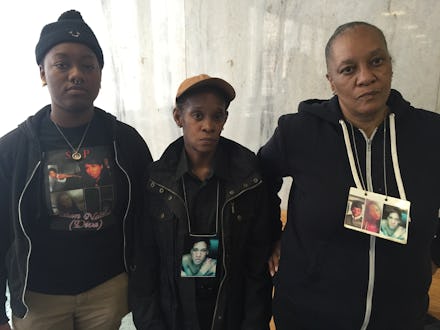Brutal New Details Emerge in Trial of Man Accused in Death of Islan Nettles

James Dixon was looking for a party. It was around midnight on Aug. 17, 2013, and Dixon, then 24, was with a group of friends in Harlem, New York, drinking and smoking in the basement of an apartment building. The group was on its way to a party uptown when they ran into Islan Nettles, a 21-year-old black transgender woman who was walking with two friends.
On Thursday, Dixon's trial began in New York City where he has been charged with first- and second-degree manslaughter, and first-degree assault. He has pleaded not guilty.
In two statements Dixon later wrote out for detectives at the New York Police Department's 32nd Precinct, he provided two different versions of what happened next. In the first, read aloud in court Thursday by NYPD Det. Heriberto Vasquez, Dixon said he was running across a street and fell when he noticed a group of girls laughing at him, so he punched one in anger.
Read more: Trial Begins for James Dixon, Man Accused of Killing Black Transgender Woman Islan Nettles
After being pressed by detectives who'd already spoken to other witnesses, Dixon then wrote a second statement in which he said he had approached Nettles, who "he believed to be female" and tried to hit on her. When he noticed his friends, who apparently were aware that Nettles was transgender, were laughing at him, he asked her "if she was a man." Before she could respond, Dixon wrote in his statement, he punched Nettles, who fell to the ground and suffered a fatal brain injury. He then punched her again.
In a statement, Dixon also referred to Nettles as the "light skinned she-male in blue jeans" and wrote that he had been "fooled by a transgender" the week prior, which caused him to a go into a "blind fury" with Nettles.
Dixon's trial began with a motion to review the manner in which the prosecution obtained his statements to police. Jury selection will begin early next week, after which both the prosecution and defense will present their cases.
Dixon, who is of medium build and carries himself with the sturdiness of a running back, walked in the courtroom on Thursday wearing his tan prison-issued jumpsuit. As he approached the defense table, he took a deep breath and sighed, seemingly bracing himself for a trial that the prosecution expects to last through the middle of April.
Meanwhile, Delores Nettles, Islan's mother, sat stoically on a bench outside of the court room, telling family members and supporters that she was bracing herself emotionally to face the man who's accused of beating to death the oldest of her seven children. Throughout the morning, family members, including her younger daughter Daynasia and her sister Lisa Allen, updated her on progress from inside the courtroom.
"It ain't right, but I'm here for my niece," Allen said outside the courtroom. "She deserves justice for her death."
Along with family, a dozen or so community members calling themselves Nettles' "extended family," also showed up to court. "We're hoping that the outcome of the trial, whenever trial ends, is going to be the maximum sentence for James Dixon," Jennifer Lopez, a transgender activist, told a crowd earlier in the morning.
Nettles is one of more than two dozen transgender women of color whose murders have been reported in the past two years. That violence, called both "historic" and proof of an "epidemic" by advocates, has spurred calls for legislative action to better address the risk factors — higher than average rates of poverty, HIV infection and unemployment — that make so many transgender people susceptible to violence.
For now, Dixon's trial is one step forward for a family and community that's long been in mourning. "It's been a complicated and long road," Allen said outside of the courtroom. "But we're making it."